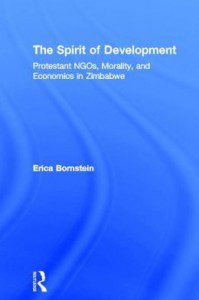I post today from Los Angeles, where I’m spending the week at World Vision International headquarters doing research for my next project. To prepare for my trip, I read Erica Bornstein’s The Spirit of Development: Protestant NGOs, Morality, and Economics in Zimbabwe (2005). The book explores the work and theology of two large Christian development organizations: World Vision* and Christian Care. During the mid-1990s when Bornstein was doing field research in Africa, these two organizations were working on rural agricultural development, including sanitation, irrigation, education, clean drinking water and micro-enterprise.
 Spirit of Development got positive reviews in anthropological and religious studies journals. Non-governmental organizations are important sources of aid in weakened African states, and reviewers appreciated Bornstein’s exploration of the religious aspects of many NGOs. The book describes how development workers seek holistic development (both spiritual and material) and practice “lifestyle evangelism,” which means “living a life in the manner of Christ and providing examples for non-believers.” To development specialists and anthropologists, Bornstein’s observation that “development becomes a religious act” seemed novel, even provocative. After all, economic development would seem to be a highly rationalistic project, not one rooted in otherworldly faith.
Spirit of Development got positive reviews in anthropological and religious studies journals. Non-governmental organizations are important sources of aid in weakened African states, and reviewers appreciated Bornstein’s exploration of the religious aspects of many NGOs. The book describes how development workers seek holistic development (both spiritual and material) and practice “lifestyle evangelism,” which means “living a life in the manner of Christ and providing examples for non-believers.” To development specialists and anthropologists, Bornstein’s observation that “development becomes a religious act” seemed novel, even provocative. After all, economic development would seem to be a highly rationalistic project, not one rooted in otherworldly faith.
Evangelical scholars also have been impressed. It is generally an empathetic text, even though Bornstein is not entirely uncritical. A secular Jew, she was hostile toward her subjects when she began her field research. Adamantly opposed to—and even fearful—of evangelicals, she wrote that missionaries carried “an essential ‘evil’ in their attempts to ‘do good.’” Through her research Bornstein remained critical of family disruptions caused by child sponsorship, World Vision’s role in the spread of neoliberalism, and the ways that religious people sometimes spiritualize inequality. (I should note that a lot of progressive and paleo-evanglicals have similar concerns). Still, Bornstein makes it clear that she came to admire the efforts of World Vision workers. Their work empowered women, brought together diverse groups, and improved the lives of many Zimbabweans. In the book’s conclusion Bornstein confessed, “I no longer knew where I stood, morally and politically.”
Which brings me to the point of this post: the self-referential nature of anthropological writing. In some ways, the book was as much about personal development as global economic development. As a historian I’ve been socialized to keep the first person out of my writing. So I’m fascinated when scholars in other disciplines insert themselves into the narrative. Bornstein’s self-disclosures—which were alternately poignant and amusing—don’t disappoint. She describes:
- Her visit to a lively Pentecostal-style worship service, where she felt an urge to accept a Zimbabwean evangelical preacher’s invitation to be “born again.”
- Her claustrophobia and frustration at the “unyielding persistence” of “super-good and super-sweet” Christian morality. In an act of rebellion after meeting with pious World Vision administrators, she listened to heavy-metal “satanic” music on the freeways of L.A. In Zimbabwe, she felt a profound desire “to do evil things” like lift a pink highlighter from a church bookstore. “I was frightened by the urge to steal it,” she writes. “Before coming to Zimbabwe, I never wanted to steal anything. What was happening to me?”
- Her mugging by five men just three weeks after arriving in Harare. They grabbed her with “such violence and desperation” and made her feel fearful, disoriented, and vulnerable. World Vision workers heard about the attack, and one man in particular prayed fervently for her healing and safety. “I was shocked by his act of caring, touched, hailed, and unraveled again. . . . I had new empathy for Christian development, and an understanding of why one might convert.”
As a voyeur, I was fascinated by these confessions of a fellow researcher. As an enthusiast of elegant prose, I found the autobiographical intrusions jarring. As a Christian compelled by St. Paul’s assertion that we “see through a glass darkly” (Bornstein’s anthropological version reads like this: “Field research is like searching for anthropological truth-values through the land mines of people’s understanding of the ethnographer”), I appreciate self-disclosure as a swipe at pretensions of objectivity. That’s a helpful reminder to historians who write from perches high above their subjects.
* For a comprehensive history of World Vision, be on the lookout for David King’s forthcoming book, which is based on his dissertation at Emory.











